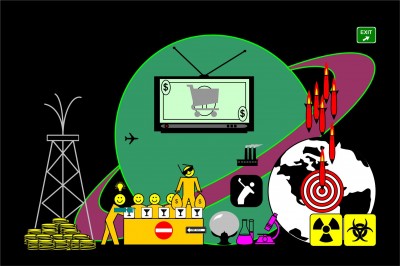New World Order – The Endgame Has Begun

Image: Mookie von Zipper
The nature of power in today’s world: The central bank system
“Let me issue and control a nation‘s money and I care not who writes the laws.” – Amschel Rothschild
Perhaps the single most important thing to know about power in the world today is that most nations do not have control over their own currencies. Instead privately owned, for-profit central banks – such as the Federal Reserve Bank in the US – create money out of nothing and then loan it at interest to their respective governments. This is an incredibly profitable scam, but that’s not the worst of it.
Not only do the central banks have the power to create money for free, they also have the power to set interest rates, to decide how much credit is issued, and to decide how much money is put into circulation. With this power central banks can – and do – orchestrate boom and bust cycles, enabling the super-wealthy owners of the banks to profit from investments during the booms, and buy up assets at bargain prices during the busts. And that still isn’t the whole story.
The most profitable of all central bank activities has been the financing of major wars, particularly the two World Wars. When nations are engaged in warfare, with their very survival at stake, the governments stretch their resources to the limit in the competition to prevail. The struggle to get more financing becomes as important as the competition on the battlefield. Moneylenders love a desperate borrower, and vast fortunes have been made by extending credit to both sides in conflicts: the longer a war continues, the more profit for the central bankers.
A very good introduction to the history of central banking, and in particular the Rothschild dynasty:
The Money Masters (1996) [FULL DOCUMENTARY]
http://www.youtube.com/watch?v=iDtBSiI13fE
Centralized wealth leads to centralized power
“Some of the biggest men in the United States are afraid of something. They know there is a power somewhere, so organized, so subtle, so watchful, so interlocked, so complete, so pervasive that they had better not speak above their breath when they speak in condemnation of it.”
– Woodrow Wilson
Our political systems, based on parties competing to get elected, are inherently prone to corruption. Just as the struggle for financing is important in military campaigns, so is it important in political campaigns. Wealthy donors are able to get special treatment, when it comes to legislation and regulation that affects their business interests. This kind of corruption, however, is only the tip of the iceberg.
A more effective way that wealth translates into power is by the placing of agents – individuals loyal to wealthy backers – into positions of influence and power. For example, when the Rothschilds and Rockefellers joined forces to establish the Federal Reserve, they recruited an unknown professor, Woodrow Wilson, promised to make him President, and secured a return promise that he would sign the Federal Reserve bill when the time came. With their influence over party bosses, their control of newspapers, and unlimited funding, they were able to get Wilson elected. He may have later regretted his bargain with the devil, as suggested in the above quotation.
A more modern example is Obama, long time protégé of Henry Kissinger, himself a key agent of the Rockefellers. Like Wilson, Obama appeared out of political nowhere, was rocketed into the Presidency, and proved his loyalty in office. In Obama’s case, this involved promptly turning the White House over to central-banker agents from Wall Street – Timothy Geithner and his buddies. They make the policy; Obama makes the speeches.
This kind of thing has been going on for centuries, first in Europe and later in the US. What began as the placement of a few key agents has evolved over time. What we have now is an international web of control, with key agents placed in political parties, governments and their agencies, the media, corporate boards, intelligence services, and the military. At the center of the web are the central banking dynasties – the Gods of Money – who remain mostly behind the scenes, pulling the strands of real power.
Read the complete article at http://news-beacon-ireland.info/?p=15435

